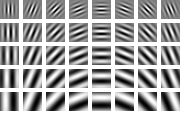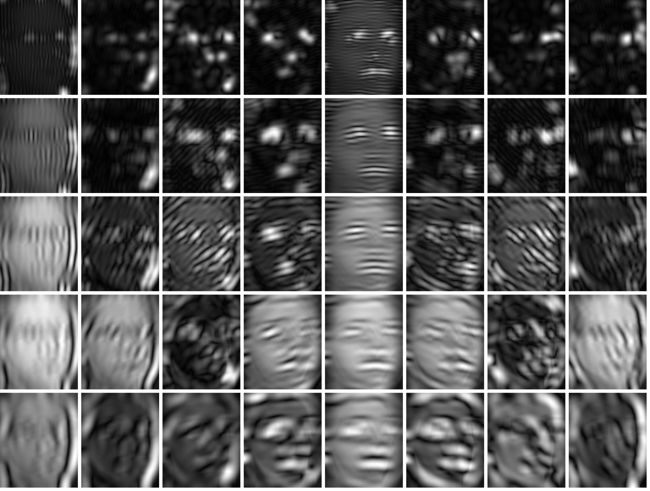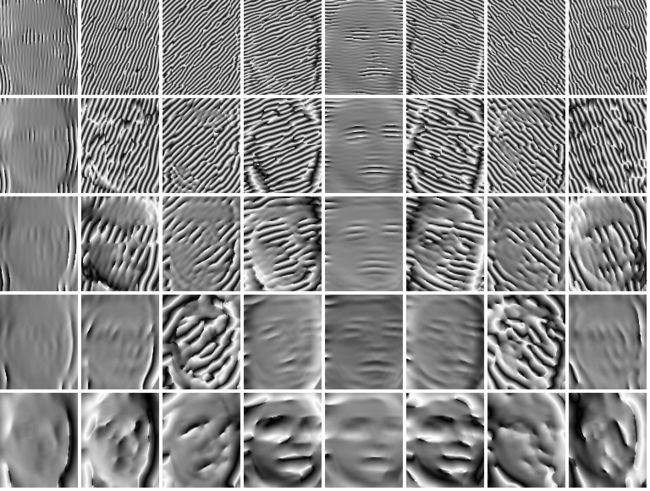Gabor的OpenCV代码
最近弄人脸识别,用到Gabor卷积核,但网上的代码似乎没有和我心意的,于是参考了自己写了下!参考了
Zhou Mian以及matlab的Gabor实现代码的代码。虽然OpenCV的imporc下面有个gabor.cpp,但那个是一般形式的公式,不是用来做人脸识别的,可以参考文献A review on Gabor wavelets for face recognition,又说到。上代码和链接地址!下载地址~
目前代码未经过更多的测试,不少功能为加入,但可以满足许多人的使用和参考了吧,很多人肯定非常非常需要,先开源下,欢迎指出错误之处。
#pragma once
#include "opencv2\opencv.hpp"
#include <vector>
using namespace std;
using namespace cv;
class GaborFR
{
public:
GaborFR();
static Mat getImagGaborKernel(Size ksize, double sigma, double theta,
double nu,double gamma=1, int ktype= CV_32F);
static Mat getRealGaborKernel( Size ksize, double sigma, double theta,
double nu,double gamma=1, int ktype= CV_32F);
static Mat getPhase(Mat &real,Mat &imag);
static Mat getMagnitude(Mat &real,Mat &imag);
static void getFilterRealImagPart(Mat& src,Mat& real,Mat& imag,Mat &outReal,Mat &outImag);
static Mat getFilterRealPart(Mat& src,Mat& real);
static Mat getFilterImagPart(Mat& src,Mat& imag);
void Init(Size ksize=Size(19,19), double sigma=2*CV_PI,
double gamma=1, int ktype=CV_32FC1);
private:
vector<Mat> gaborRealKernels;
vector<Mat> gaborImagKernels;
bool isInited;
};
#include "stdafx.h"
#include "GaborFR.h"
GaborFR::GaborFR()
{
isInited = false;
}
void GaborFR::Init(Size ksize, double sigma,double gamma, int ktype)
{
gaborRealKernels.clear();
gaborImagKernels.clear();
double mu[8]={0,1,2,3,4,5,6,7};
double nu[5]={0,1,2,3,4};
int i,j;
for(i=0;i<5;i++)
{
for(j=0;j<8;j++)
{
gaborRealKernels.push_back(getRealGaborKernel(ksize,sigma,mu[j]*CV_PI/8,nu[i],gamma,ktype));
gaborImagKernels.push_back(getImagGaborKernel(ksize,sigma,mu[j]*CV_PI/8,nu[i],gamma,ktype));
}
}
isInited = true;
}
Mat GaborFR::getImagGaborKernel(Size ksize, double sigma, double theta, double nu,double gamma, int ktype)
{
double sigma_x = sigma;
double sigma_y = sigma/gamma;
int nstds = 3;
double kmax = CV_PI/2;
double f = cv::sqrt(2.0);
int xmin, xmax, ymin, ymax;
double c = cos(theta), s = sin(theta);
if( ksize.width > 0 )
{
xmax = ksize.width/2;
}
else//这个和matlab中的结果一样,默认都是19 !
{
xmax = cvRound(std::max(fabs(nstds*sigma_x*c), fabs(nstds*sigma_y*s)));
}
if( ksize.height > 0 )
{
ymax = ksize.height/2;
}
else
{
ymax = cvRound(std::max(fabs(nstds*sigma_x*s), fabs(nstds*sigma_y*c)));
}
xmin = -xmax;
ymin = -ymax;
CV_Assert( ktype == CV_32F || ktype == CV_64F );
float* pFloat;
double* pDouble;
Mat kernel(ymax - ymin + 1, xmax - xmin + 1, ktype);
double k = kmax/pow(f,nu);
double scaleReal= k*k/sigma_x/sigma_y;
for( int y = ymin; y <= ymax; y++ )
{
if( ktype == CV_32F )
{
pFloat = kernel.ptr<float>(ymax-y);
}
else
{
pDouble = kernel.ptr<double>(ymax-y);
}
for( int x = xmin; x <= xmax; x++ )
{
double xr = x*c + y*s;
double v = scaleReal*exp(-(x*x+y*y)*scaleReal/2);
double temp=sin(k*xr);
v = temp*v;
if( ktype == CV_32F )
{
pFloat[xmax - x]= (float)v;
}
else
{
pDouble[xmax - x] = v;
}
}
}
return kernel;
}
//sigma一般为2*pi
Mat GaborFR::getRealGaborKernel( Size ksize, double sigma, double theta,
double nu,double gamma, int ktype)
{
double sigma_x = sigma;
double sigma_y = sigma/gamma;
int nstds = 3;
double kmax = CV_PI/2;
double f = cv::sqrt(2.0);
int xmin, xmax, ymin, ymax;
double c = cos(theta), s = sin(theta);
if( ksize.width > 0 )
{
xmax = ksize.width/2;
}
else//这个和matlab中的结果一样,默认都是19 !
{
xmax = cvRound(std::max(fabs(nstds*sigma_x*c), fabs(nstds*sigma_y*s)));
}
if( ksize.height > 0 )
ymax = ksize.height/2;
else
ymax = cvRound(std::max(fabs(nstds*sigma_x*s), fabs(nstds*sigma_y*c)));
xmin = -xmax;
ymin = -ymax;
CV_Assert( ktype == CV_32F || ktype == CV_64F );
float* pFloat;
double* pDouble;
Mat kernel(ymax - ymin + 1, xmax - xmin + 1, ktype);
double k = kmax/pow(f,nu);
double exy = sigma_x*sigma_y/2;
double scaleReal= k*k/sigma_x/sigma_y;
int x,y;
for( y = ymin; y <= ymax; y++ )
{
if( ktype == CV_32F )
{
pFloat = kernel.ptr<float>(ymax-y);
}
else
{
pDouble = kernel.ptr<double>(ymax-y);
}
for( x = xmin; x <= xmax; x++ )
{
double xr = x*c + y*s;
double v = scaleReal*exp(-(x*x+y*y)*scaleReal/2);
double temp=cos(k*xr) - exp(-exy);
v = temp*v;
if( ktype == CV_32F )
{
pFloat[xmax - x]= (float)v;
}
else
{
pDouble[xmax - x] = v;
}
}
}
return kernel;
}
Mat GaborFR::getMagnitude(Mat &real,Mat &imag)
{
CV_Assert(real.type()==imag.type());
CV_Assert(real.size()==imag.size());
int ktype=real.type();
int row = real.rows,col = real.cols;
int i,j;
float* pFloat,*pFloatR,*pFloatI;
double* pDouble,*pDoubleR,*pDoubleI;
Mat kernel(row, col, real.type());
for(i=0;i<row;i++)
{
if( ktype == CV_32FC1 )
{
pFloat = kernel.ptr<float>(i);
pFloatR= real.ptr<float>(i);
pFloatI= imag.ptr<float>(i);
}
else
{
pDouble = kernel.ptr<double>(i);
pDoubleR= real.ptr<double>(i);
pDoubleI= imag.ptr<double>(i);
}
for(j=0;j<col;j++)
{
if( ktype == CV_32FC1 )
{
pFloat[j]= sqrt(pFloatI[j]*pFloatI[j]+pFloatR[j]*pFloatR[j]);
}
else
{
pDouble[j] = sqrt(pDoubleI[j]*pDoubleI[j]+pDoubleR[j]*pDoubleR[j]);
}
}
}
return kernel;
}
Mat GaborFR::getPhase(Mat &real,Mat &imag)
{
CV_Assert(real.type()==imag.type());
CV_Assert(real.size()==imag.size());
int ktype=real.type();
int row = real.rows,col = real.cols;
int i,j;
float* pFloat,*pFloatR,*pFloatI;
double* pDouble,*pDoubleR,*pDoubleI;
Mat kernel(row, col, real.type());
for(i=0;i<row;i++)
{
if( ktype == CV_32FC1 )
{
pFloat = kernel.ptr<float>(i);
pFloatR= real.ptr<float>(i);
pFloatI= imag.ptr<float>(i);
}
else
{
pDouble = kernel.ptr<double>(i);
pDoubleR= real.ptr<double>(i);
pDoubleI= imag.ptr<double>(i);
}
for(j=0;j<col;j++)
{
if( ktype == CV_32FC1 )
{
// if(pFloatI[j]/(pFloatR[j]+pFloatI[j]) > 0.99)
// {
// pFloat[j]=CV_PI/2;
// }
// else
// {
// pFloat[j] = atan(pFloatI[j]/pFloatR[j]);
pFloat[j] = asin(pFloatI[j]/sqrt(pFloatR[j]*pFloatR[j]+pFloatI[j]*pFloatI[j]));
/* }*/
// pFloat[j] = atan2(pFloatI[j],pFloatR[j]);
}//CV_32F
else
{
if(pDoubleI[j]/(pDoubleR[j]+pDoubleI[j]) > 0.99)
{
pDouble[j]=CV_PI/2;
}
else
{
pDouble[j] = atan(pDoubleI[j]/pDoubleR[j]);
}
// pDouble[j]=atan2(pDoubleI[j],pDoubleR[j]);
}//CV_64F
}
}
return kernel;
}
Mat GaborFR::getFilterRealPart(Mat& src,Mat& real)
{
CV_Assert(real.type()==src.type());
Mat dst;
Mat kernel;
flip(real,kernel,-1);//中心镜面
// filter2D(src,dst,CV_32F,kernel,Point(-1,-1),0,BORDER_CONSTANT);
filter2D(src,dst,CV_32F,kernel,Point(-1,-1),0,BORDER_REPLICATE);
return dst;
}
Mat GaborFR::getFilterImagPart(Mat& src,Mat& imag)
{
CV_Assert(imag.type()==src.type());
Mat dst;
Mat kernel;
flip(imag,kernel,-1);//中心镜面
// filter2D(src,dst,CV_32F,kernel,Point(-1,-1),0,BORDER_CONSTANT);
filter2D(src,dst,CV_32F,kernel,Point(-1,-1),0,BORDER_REPLICATE);
return dst;
}
void GaborFR::getFilterRealImagPart(Mat& src,Mat& real,Mat& imag,Mat &outReal,Mat &outImag)
{
outReal=getFilterRealPart(src,real);
outImag=getFilterImagPart(src,imag);
}
main
// Win32TestPure.cpp : 定义控制台应用程序的入口点。
#include "stdafx.h"
#include <vector>
#include <deque>
#include <iomanip>
#include <stdexcept>
#include <string>
#include <iostream>
#include <fstream>
#include <direct.h>//_mkdir()
#include "opencv2\opencv.hpp"
#include "GaborFR.h"
using namespace std;
using namespace cv;
int main()
{
//Mat M = getGaborKernel(Size(9,9),2*CV_PI,u*CV_PI/8, 2*CV_PI/pow(2,CV_PI*(v+2)/2),1,0);
Mat saveM;
//s8-4
//s1-5
//s1中年男人
Mat I=imread("H:\\pic\\s1-5.bmp",-1);
normalize(I,I,1,0,CV_MINMAX,CV_32F);
Mat showM,showMM;Mat M,MatTemp1,MatTemp2;
Mat line;
int iSize=50;//如果数值比较大,比如50则接近论文中所述的情况了!估计大小和处理的源图像一样!
for(int i=0;i<8;i++)
{
showM.release();
for(int j=0;j<5;j++)
{
Mat M1= GaborFR::getRealGaborKernel(Size(iSize,iSize),2*CV_PI,i*CV_PI/8+CV_PI/2, j,1);
Mat M2 = GaborFR::getImagGaborKernel(Size(iSize,iSize),2*CV_PI,i*CV_PI/8+CV_PI/2, j,1);
//加了CV_PI/2才和大部分文献的图形一样,不知道为什么!
Mat outR,outI;
GaborFR::getFilterRealImagPart(I,M1,M2,outR,outI);
// M=GaborFR::getPhase(M1,M2);
// M=GaborFR::getMagnitude(M1,M2);
// M=GaborFR::getPhase(outR,outI);
// M=GaborFR::getMagnitude(outR,outI);
// M=GaborFR::getMagnitude(outR,outI);
// MatTemp2=GaborFR::getPhase(outR,outI);
// M=outR;
M=M1;
// resize(M,M,Size(100,100));
normalize(M,M,0,255,CV_MINMAX,CV_8U);
showM.push_back(M);
line=Mat::ones(4,M.cols,M.type())*255;
showM.push_back(line);
}
showM=showM.t();
line=Mat::ones(4,showM.cols,showM.type())*255;
showMM.push_back(showM);
showMM.push_back(line);
}
showMM=showMM.t();
// bool flag=imwrite("H:\\out.bmp",showMM);
imshow("saveMM",showMM);waitKey(0);
return 0;
}//endof main()
以下图片可能和程序实际运行结果有点不同,图片只是示意图,代码暂时没问题。需要考虑的是iSize大小问题,首先iSize要用奇数,然后大部分文献iSize都比较大,好像是100左右,但没看到他们描述过卷积核的大小。


